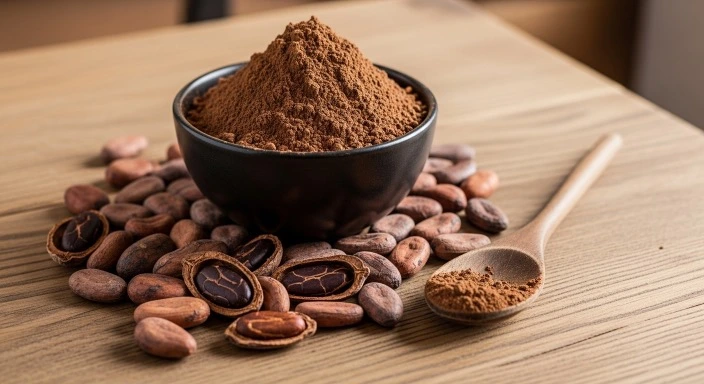Cocoa powder is more than just the foundation of your favorite chocolate desserts — it’s a nutrient-dense superfood with centuries of history and a surprising list of health benefits. From antioxidant protection to natural mood support, the science behind cocoa explains why this ingredient has remained a symbol of comfort, energy, and even vitality.
Today, we know that pure cocoa powder isn’t just about flavor. It’s packed with minerals, flavonoids, and compounds that influence everything from heart health to brain function. And unlike processed chocolate bars, high-quality cocoa powder delivers concentrated benefits without the added sugar or fat.
Let’s dive into the real health benefits of cocoa powder — what the research says, how to use it, and why it might deserve a permanent spot in your pantry.
If you want to know how cocoa affects your mood and focus, read our in-depth post Chocs and Cheers: Why Chocolate Makes Every Moment Better
What Exactly Is Cocoa Powder?
Cocoa powder is made by grinding fermented, roasted cocoa beans and removing most of the cocoa butter. What remains is a dry, concentrated form of cocoa solids — rich in flavonoids, antioxidants, and minerals like magnesium, iron, and potassium.
There are two main types:
- Natural cocoa powder: acidic, lighter in color, and full of unaltered antioxidants.
- Dutch-processed cocoa: treated with alkali to reduce acidity, giving a darker color and smoother flavor but fewer antioxidants.
Both offer benefits, though natural cocoa retains more of the compounds that make it a nutritional powerhouse.
Learn more about how cocoa is processed in this overview from ScienceDirect
1. Cocoa Powder Is Rich in Antioxidants
Cocoa is one of the most antioxidant-rich foods on the planet. In fact, the ORAC score (a measure of antioxidant capacity) for unsweetened cocoa powder is higher than for blueberries, green tea, or red wine.
Antioxidants protect your body from oxidative stress — a process that damages cells and contributes to aging and chronic disease. The main antioxidant compounds in cocoa are flavonoids, especially epicatechin, catechin, and procyanidins.
A Frontiers in Nutrition study found that regular consumption of cocoa flavonoids can help reduce inflammation, improve blood vessel function, and support cardiovascular health.
Antioxidants don’t just protect cells; they also improve circulation and brain oxygenation, making you feel more alert and energized naturally.
Want to understand cocoa’s full potential for brain health? Read Is Dark Chocolate Really Healthy?
2. Supports Heart Health and Blood Flow
Cocoa powder

Cocoa powder
One of cocoa’s best-documented benefits is its effect on heart and blood vessel health. Flavonoids help the body produce nitric oxide, which relaxes blood vessels and improves circulation.
This means cocoa powder can:
- Lower blood pressure in some individuals
- Improve cholesterol ratios
- Support overall cardiovascular performance
A Nutrients journal review found that consuming cocoa flavanols consistently can improve endothelial function — a key factor in preventing arterial stiffness and hypertension.
You don’t need to eat a full chocolate bar to benefit; a tablespoon of unsweetened cocoa powder stirred into milk or oatmeal can be enough to support circulation.
3. Enhances Brain Function and Focus
Cocoa doesn’t just make you happier; it may also help you think more clearly. The same compounds that support heart health also benefit the brain.
Cocoa flavonoids have been shown to increase blood flow to the brain’s frontal cortex — the area linked to focus, memory, and problem-solving. Some studies suggest moderate cocoa intake can improve reaction time, mental clarity, and overall alertness.
A Psychopharmacology study found that participants who consumed cocoa with higher flavonoid content performed better on cognitive tasks than those who didn’t.
It’s no wonder that sipping cocoa or nibbling dark chocolate feels like fuel for creativity.
For another brain-friendly treat, see Does Hot Chocolate Have Caffeine? The Truth About Your Cozy Cup)
4. Natural Mood Booster
Cocoa’s mood-boosting reputation isn’t just emotional — it’s chemical. It contains phenylethylamine (PEA), a compound associated with pleasure and the feeling of being in love, as well as small amounts of tryptophan, a precursor to serotonin.
Together with theobromine and a touch of caffeine, cocoa can create a sense of calm energy — alert but not jittery, relaxed yet focused.
A 2017 study in Appetite confirmed that cocoa’s bioactive compounds positively influence mood and reduce stress-related hormones. That’s why a warm cup of cocoa feels emotionally comforting — the chemistry backs it up.
Science Direct published a full study on cocoa and stress.
5. Provides a Gentle Energy Boost
Unlike coffee, which spikes energy rapidly, cocoa provides a steady lift. That’s because it contains theobromine, a mild stimulant similar to caffeine but longer-lasting and less intense.
Theobromine increases blood flow, relaxes smooth muscles, and supports energy metabolism — without the crash that coffee sometimes causes.
A tablespoon of cocoa powder contains about 12 mg of caffeine and 150 mg of theobromine — enough to gently enhance focus and endurance.
Cocoa-based drinks like a morning smoothie or mid-afternoon cocoa latte can help sustain energy without overstimulation.
6. Rich in Essential Minerals
Cocoa powder is loaded with minerals that support everyday wellness:
- Magnesium — for muscle relaxation, nerve function, and stress balance
- Iron — essential for oxygen transport in the blood
- Zinc — key for immunity and skin repair
- Potassium — supports healthy heart rhythm and hydration
- Calcium and Copper — help maintain bone and connective tissue strength
Few foods deliver such a balanced nutrient profile in a small serving. Incorporating one to two tablespoons of unsweetened cocoa daily can contribute meaningfully to micronutrient intake.
7. May Support Weight Management
It sounds contradictory, but cocoa might actually help manage appetite and metabolism when used wisely.
Cocoa polyphenols have been shown to regulate hunger hormones like ghrelin and leptin, potentially reducing cravings and supporting satiety. It’s one reason dark chocolate is often recommended in small portions as a smart dessert.
A European Journal of Clinical Nutrition study found that cocoa intake was associated with improved metabolism and lower body mass index in certain populations, especially when combined with a balanced diet and exercise.
You can explore balanced indulgence in Easy No-Bake Chocolate Desserts for Every Occasion
8. Supports Healthy Skin
Cocoa doesn’t just nourish from within — it supports your skin too. Its flavonoids improve microcirculation, which can help hydrate and protect the skin from oxidative stress.
A Journal of Nutrition study found that participants who drank flavonoid-rich cocoa daily had smoother, more hydrated skin after 12 weeks.
Cocoa’s antioxidants can also help neutralize UV damage when paired with a healthy diet.
Want to explore cocoa’s effect on beauty further? Read Dark vs. Milk Chocolate: The Surprising Health Differences You Need to Know
9. Anti-Inflammatory Effects
Chronic inflammation contributes to fatigue, joint pain, and many chronic diseases. Cocoa’s flavonoids have powerful anti-inflammatory properties, helping calm the body’s internal stress response.
A review from Molecular Nutrition & Food Research found that cocoa polyphenols reduce inflammatory markers, especially when consumed regularly as part of a balanced diet.
This is another reason moderate cocoa consumption fits so well in wellness routines — it’s indulgence that truly supports health.
10. Easy Ways to Add Cocoa Powder to Your Day
The best way to enjoy cocoa’s benefits is to use unsweetened natural or Dutch-processed cocoa in versatile ways. Avoid mixes with sugar or artificial flavors — they dilute the goodness.
Try these simple ideas:
- Blend cocoa powder into smoothies with banana and almond milk.
- Stir into morning oatmeal for a chocolatey start.
- Make homemade hot cocoa with raw honey and cinnamon.
- Add a spoonful to yogurt or chia pudding.
- Use cocoa in chili or mole for a rich savory depth.
Start with one tablespoon a day and see how your body feels.
For inspiration, check our post The Best Chocolate Pound Cake Recipe You’ll Ever Make
Common Myths About Cocoa and Health
Myth 1: Cocoa powder is the same as hot chocolate mix.
Not true — hot chocolate mix usually contains sugar, milk powder, and additives. Pure cocoa powder has concentrated nutrients.
Myth 2: Cocoa is bad for your heart because it’s chocolate.
Wrong again. Pure cocoa is heart-healthy; it’s the added fats and sugars in chocolate candy that cause issues.
Myth 3: Dutch-processed cocoa is unhealthy.
While it has fewer antioxidants, Dutch cocoa is still nutritious and often better tolerated for those with sensitive stomachs.
Choosing the Right Cocoa Powder
Look for:
- 100% unsweetened cocoa powder
- Organic and non-alkalized (natural) for maximum antioxidants
- Minimal or no added ingredients
- Sustainable sourcing (fair trade where possible)
Store in a cool, dry place, tightly sealed to prevent moisture and flavor loss.
The Botton Line
Cocoa powder is more than a baking staple — it’s one of nature’s most potent sources of antioxidants, minerals, and gentle energy. From improving blood flow and focus to supporting heart and skin health, its benefits extend far beyond indulgence.
Adding a little cocoa to your daily routine isn’t about guilt-free dessert; it’s about balance, flavor, and nourishment. It reminds us that wellness can be delicious, and that health doesn’t have to mean restriction.
So go ahead — mix, whisk, and savor. A spoonful of cocoa might just make your day better in every sense.
Continue your chocolate wellness journey with Gluten-Free German Chocolate Cake Recipe You Will Love
Discover more chocolate wisdom on ChocoTalks.com — where every bite tells a story.

